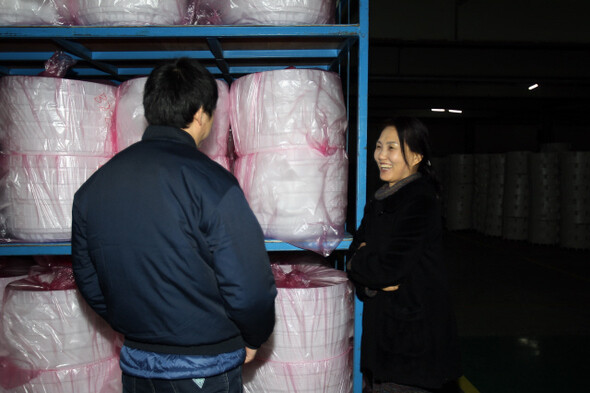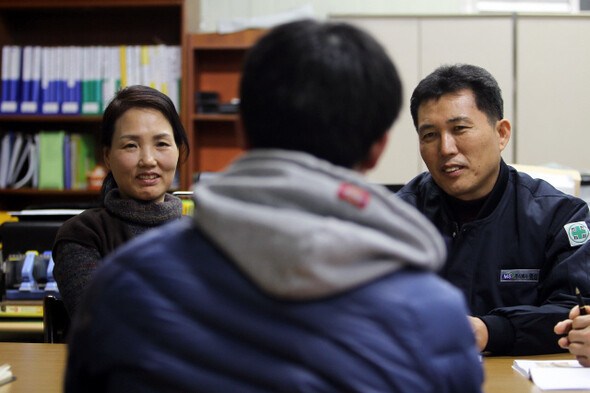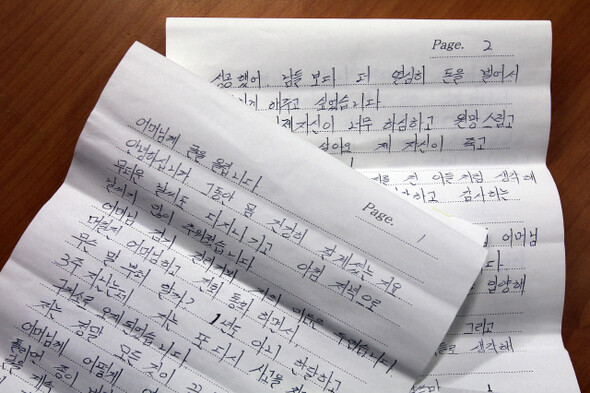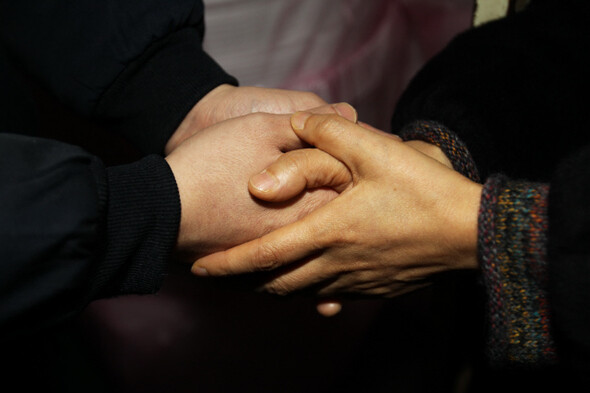hankyoreh
Links to other country sites 다른 나라 사이트 링크
[Feature] Prisoners given new start with factory jobs

By Jung Dae-ha, Gwangju correspondent
“Are you getting enough sleep? Your haircut looks great!” said Kim Myung-oh, 53. It was the afternoon of Jan. 23, and Kim was in the visitation room at Suncheon Prison in South Jeolla Province. Behind the bars was a man surnamed Lee, 33, wearing a prisoner’s jumpsuit. “Yes,” he said, looking bashful.
This reporter’s eyes were drawn to a tag on the right side of Lee’s jumpsuit that said, “Korean cuisine.” Lee was arrested in Oct. 2013 on charges of fraud and sentenced to two and a half years in prison. He is currently receiving job training and hopes to be certified as a Korean cook in May.
Kim really wanted to visit Lee one time before Lunar New Year. She continues talking, asking why Lee hadn’t written a letter.
“I’m sorry I made you so worried,” Lee said, his words trailing off. “I decided not to write any letters until I got myself together. But I have been copying a lot of Bible passages to save up and send to you. I’ve gotten all the way to Psalms.”
“Mr. Jeon and everyone else are doing well, aren’t they?” Lee asked.
Kim Hyung-oh, 49, a pastor who had accompanied the group, encouraged Lee to do his best to prepare for the Korean cuisine examination.

Since the age of 14, Lee has been in and out of prison more than ten times. The people who have welcomed Lee into their lives are Kim and her husband, Jeon Sang-don, 54. Jeon is the president of Myeongseong, a small company operating in the Hanam Industrial Complex in Gwangju. The company assembles parts for home appliances.
The first time that Jeon and his wife met Lee was in March 2012. “Gwangju Prison contacted me about hiring convicts who were to be released. When I saw the list of crimes that the prisoners had committed, I hesitated,” Jeon said.
But his wife Kim, who comes to the office to help out, was enthusiastic. Kim, who has developed her religious faith while attending church for dozens of years, had been interested in helping young people when they leave orphanages. Oh Su-dong, 49, head of the job placement department at Gwangju Prison, brought Lee when he visited the factory a month before his release and convinced Jeon to hire him.
Sent to an orphanage at the age of three, Lee dropped out of elementary school and started learning “the trade” at the age of 12. Once he was out of the orphanage, he lived with older orphans. He became a pickpocket so the older kids wouldn’t hit him.
“When I got out of juvenile hall after about six months or so inside, the older kids were at the gate waiting for me. They picked me up and took me to their place. They taught me how to do bad things, and if I refused to do them, they would beat me,” Lee wrote in a letter he sent to Kim in Sep. 2013.
When he was working as a seamster, a friend tempted him with the promise of “making a lot of money.” He took part in a robbery and then went to prison. After that, he entered a cycle of being released and then sent back to prison.
Despite the 14 convictions on his record, Lee got a job at the factory run by Jeon and his wife. This was the first decent job that Lee had ever had. He jumped at the opportunity that Jeon gave him.
“One time, Lee asked me if he could call me ‘Mom,’ so I told him he could,” Kim said. “From the time he called me ‘Mom,’ he shared everything with me. When I heard his story, I cried over and over again.”
Lee even took his new Mom to his favorite fried food restaurant and introduced her to the restaurant’s owner as his mother. Kim also joined Lee on a visit to the orphanage in Yeonggwang County, South Jeolla Province, where he had spent his early years.

But Jeon and Kim had plenty of trouble during the eight months that Lee worked for them. Lee was living at a shelter operated by the National Rehabilitation Agency while working at the factory. Then he was caught driving someone else’s car without permission and sentenced to 10 months in prison.
Jeon and his wife paid the settlement money and submitted a petition to the court, helping Lee get out of prison on parole after only six months, but two months later he gave in to temptation and committed another crime.
“I felt so disgusted with myself that I went to the bathroom and cried [. . .] I’m so sorry, Mom. Please don’t abandon me,” Lee wrote to Kim in a letter. “Now, all I have is the earnest desire to live a life of hope.”
There are a total of five people from the prison who are working at Myeongseong, and four of them have been working there for more than a year. One of them is wearing an electronic bracelet. These workers are generally in charge of moving parts for washing machines and automobiles that are produced in an injection mold.
Since 2011, Gwangju Prison has reached out to around 60 companies to help prisoners reentering society find work. In tandem with the Korea Rehabilitation Agency, it also provides various services, including job placement, consulting for restoring credit, and providing room and board.
“When released prisoners hide the fact that they have a criminal record to get a job, they can be really hurt when the company finds out later. That’s why it’s much better to tell the company first and then get them a job,” said Oh Su-dong.
“Sometimes when we visit a company looking for workers and ask them to hire some former convicts, the door is slammed in our face. Even so, more and more company leaders are taking interest in the issue,” Oh said.
Another man working at Myeongseong, surnamed Yun, 31, also grew up at an orphanage. When Yun was a first grader in elementary school, he was shocked to learn the secret of his birth from his adoptive father. His father told him that he had found Yun by chance as a baby boy, abandoned in front of the old express bus terminal in Gwangju. He had raised him ever since, the man said.
Yun’s happiest memory was the two months that he spent with his younger sister after his adoptive father (who was working as a tenant farmer cultivating pears in Naju, South Jeolla Province) helped him get in touch with his birthfather. But the boy returned to his adoptive father when his birth father shocked him with the words, “You are not my son.” Unable to endure the abuse of his adoptive mother, Yun ran away from home during his third year of elementary school.
Joining a gang in an underground shopping center, he became a beggar. He put his hands on other people’s things and told lies to fill his starving belly. With the help of the police, he was admitted to an orphanage run by a Catholic nunnery and barely managed to finish vocational high school.

After losing control of his emotions in the heat of the moment, Yun committed a serious crime and was sent to Gwangju Prison for two years. But since getting a job at Myeongseong in 2012, he has been living in his own one-room apartment. He sets aside a portion of his wages each month in a savings account and has also set up a special account with the hope of buying his own home someday. He has entrusted the bankbook to his “mother” - Kim. “Both my birthfather and my adoptive father passed away,” Yun said. “I always feel grateful and sorry to the adoptive father who raised me.”
“I’ve gotten two new sons. You better not disappoint your mother, got it?” Kim asked Yun anxiously, squeezing his hand. Yun had joined her on her visit to Lee at the prison.
“A considerable number of released convicts are from broken homes, so they aren’t very good at controlling their emotions. We just accept them and wait for them to open their hearts. When I see them changing little by little, I feel happy, too,” said Kim.
Please direct questions or comments to [english@hani.co.kr]

Editorial・opinion
![[Column] Season 2 of special prosecutor probe may be coming to Korea soon [Column] Season 2 of special prosecutor probe may be coming to Korea soon](https://flexible.img.hani.co.kr/flexible/normal/500/300/imgdb/original/2024/0426/3317141030699447.jpg) [Column] Season 2 of special prosecutor probe may be coming to Korea soon
[Column] Season 2 of special prosecutor probe may be coming to Korea soon![[Column] Park Geun-hye déjà vu in Yoon Suk-yeol [Column] Park Geun-hye déjà vu in Yoon Suk-yeol](https://flexible.img.hani.co.kr/flexible/normal/500/300/imgdb/original/2024/0424/651713945113788.jpg) [Column] Park Geun-hye déjà vu in Yoon Suk-yeol
[Column] Park Geun-hye déjà vu in Yoon Suk-yeol- [Editorial] New weight of N. Korea’s nuclear threats makes dialogue all the more urgent
- [Guest essay] The real reason Korea’s new right wants to dub Rhee a founding father
- [Column] ‘Choson’: Is it time we start referring to N. Korea in its own terms?
- [Editorial] Japan’s rewriting of history with Korea has gone too far
- [Column] The president’s questionable capacity for dialogue
- [Column] Are chaebol firms just pizza pies for families to divvy up as they please?
- [Column] Has Korea, too, crossed the Rubicon on China?
- [Correspondent’s column] In Japan’s alliance with US, echoes of its past alliances with UK
Most viewed articles
- 1[Column] Season 2 of special prosecutor probe may be coming to Korea soon
- 2‘We must say no’: Seoul defense chief on Korean, USFK involvement in hypothetical Taiwan crisis
- 3Is N. Korea threatening to test nukes in response to possible new US-led sanctions body?
- 4Amnesty notes ‘erosion’ of freedom of expression in Korea in annual human rights report
- 5Division commander ordered troops to enter raging flood waters before Marine died, survivor says
- 6N. Korean delegation’s trip to Iran shows how Pyongyang is leveraging ties with Moscow
- 7[Editorial] Korea’s surprise Q1 growth requires objective assessment, not blind fanfare
- 8Is Japan about to snatch control of Line messenger from Korea’s Naver?
- 9No good, very bad game for Korea puts it out of Olympics for first time since 1988
- 10[Reportage] On US campuses, student risk arrest as they call for divestment from Israel